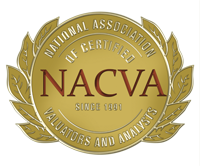

National Association of Certified Valuators and Analysts™ (NACVA®) Contact: Sheila Travis, Director of Member Services 5217 South State Street | Suite 400 | Salt Lake City, UT USA 84107 l www.NACVA.com | SheilaT1@NACVA.com l (801) 486-0600 |
Press Release
NACVA Announces Merger of Accredited Valuation Analyst (AVA) SALT LAKE CITY—March 25, 2013—Effective April 1, 2013, the National Association of Certified Valuators and Analysts' (NACVA) Accredited Valuation Analyst™ (AVA®) credential will be merged into the Certified Valuation Analyst®(CVA®). Holders of the AVA may continue to hold themselves out as an AVA through March 31, 2014, after which they must drop the AVA appellation and use only the CVA. AVAs may adopt the CVA appellation anytime between April 1, 2013 and March 31, 2014, but may not use both appellations—they must choose one or the other. “For over a decade, there has been discussion of merging the two credentials with the CVA remaining as NACVA’s, and the industry’s, premier business valuation credential,” states Parnell Black, MBA, CPA, CVA, and NACVA's CEO. “Starting around seven years ago, our Valuation Credentialing Board began discussions about merging the AVA into the CVA. To help formulate their thoughts and build consensus, they took a series of surveys to gauge the opinions and emotions of our members regarding the merger. Over a period of years, we saw growing consensus and agreement that merging the two credentials was indeed in NACVA’s members' best interests." According to the NACVA, some significant reasons cited in the surveys conducted that supported the merging of the credentials were:
In 2009, NACVA’s Valuation Credentialing Board approved the merger of the AVA designation into the CVA. NACVA’s Executive Advisory Board also approved the merger. “Though the credential merger was approved by our governing boards in 2009, we were reluctant to effect the merge then due to the economic recession and feeling that maintaining the status quo through these difficult times was the best course of action,” states Parnell Black. “This merger needed to happen, and it needed to happen now,” states Marc Bello, CPA, ABV, MST, CVA,
MAFF, with Edelstein & Company, LLC in Boston, MA, who is the current Chair of NACVA’s Executive Advisory Board. “Both CVAs and AVAs regularly are finding the need to explain the difference between two designations, whether it be in court, while giving presentations, or explaining their credential to a client. This problem is compounded in firms with both CVA and AVA designated members. This is a hurdle many members find annoying and even slightly embarrassing as it makes little sense and is hard to explain.” “Some members have suggested that by merging the two designations, NACVA is diverging further from its ‘CPA only’ founding roots. The fact is, NACVA's non-CPA AVA designation has been in place since 1999. For 14 years our roots have included non-CPA professionals,” states Mark Kucik, CPA, CVA, CM&AA, CFF, CPVA, with the Kucik Valuation Group LLC in Chicago, IL and NACVA's Vice President. “We all recognize that a CPA's knowledge of accounting is important and even fundamental to providing a quality business valuation product, but the same argument can be made for finance, economics, and assessing risk. An ideally qualified valuator should have a solid command of all these areas of knowledge. AVAs are required to have a degree in a business discipline or a non-business undergraduate degree combined with an MBA or higher degree in a field of business,” states Scott Saltzman, CPA, CVA, ASA, MAFF, with Saltzman LLC in Denver, CO and NACVA’s President. “NACVA will continue to acknowledge the AVA in its Association brochure available in hardcopy format and found on our website for at least three years to help support AVAs in the transition and to educate the users of their services about their new appellation,” states Sheila Travis, NACVA’s Director of Member Services. “Over the next several months, all AVAs will receive new CVA Certificates for display. The certificates will carry NACVA’s newly designed CVA seal, thus, all CVAs will be receiving new certificates as well.” |
About the NACVA
|